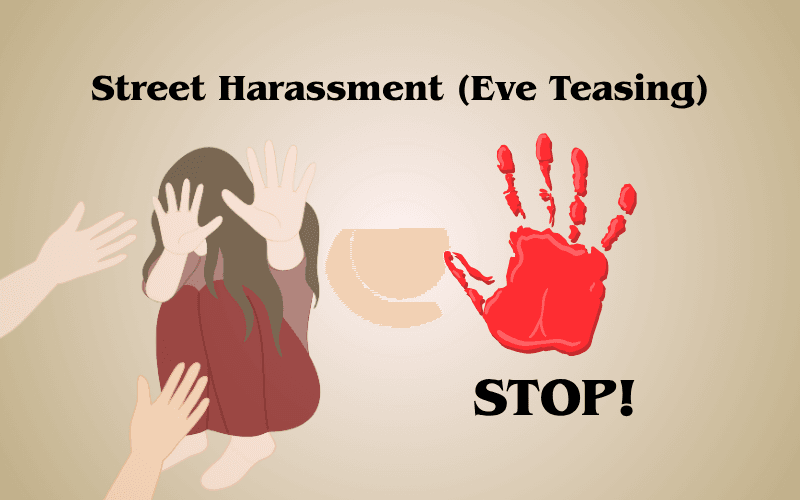Street Harassment (Eve Teasing): 5 Root Causes & Solutions

The public harassment of women, a crisis often called Street Harassment or “Eve Teasing,” is a serious social issue that poses a significant threat to the dignity and safety of women worldwide. The term “Eve Teasing” combines “Eve,” representing woman, with “tease,” meaning to annoy or provoke. At its core, it is the act of harassing a woman. Unfortunately, due to a widespread decline in moral, social, and religious values, this criminal behavior is alarmingly on the rise. Consequently, women continually face verbal, emotional, and physical harassment in educational institutions, workplaces, and public spaces. This unbearable situation inflicts deep psychological trauma on many women, causing them to drop out of school and, in the most tragic cases, pushing them toward suicide. Therefore, this is not just an individual’s problem; it’s a reflection of a society’s health. In this article, we will analyze the deep-rooted causes of this global crisis and explore permanent, effective solutions grounded in the moral and ethical principles of the Quran and Sunnah.
The Severity of the Problem: A Human and Religious Perspective
Various forms of harassment against women are prevalent globally. Alongside heinous crimes like rape, acid attacks, domestic violence, and workplace abuse, verbal and behavioral harassment acts as a silent killer. In fact, many women do not report these incidents of Street Harassment due to social pressure, shame, or fear, which only emboldens the perpetrators.
All religions and ethical systems, especially Islam, vehemently reject any act that dishonors another person. Islam considers harassing anyone, particularly a woman, a Kabira Gunah (a major sin). It is an infringement on another’s dignity, safety, and personal freedom, all of which Islam strictly forbids. This act falls under the categories of Zulm (oppression) and creating Fasad fil Ard (mischief on Earth). The Almighty Allah states in the Holy Quran:
وَالَّذِينَ يُؤْذُونَ الْمُؤْمِنِينَ وَالْمُؤْمِنَاتِ بِغَيْرِ مَا اكْتَسَبُوا فَقَدِ احْتَمَلُوا بُهْتَانًا وَإِثْمًا مُّبِينًا
“And those who harm believing men and believing women for [something] other than what they have earned have certainly borne slander and a manifest sin.”
(Surah Al-Ahzab, 33:58)
This verse unequivocally proves that causing harm to an innocent person is a direct violation of God’s law.
The Moral Decay of Society: Unpacking the Root Causes of Street Harassment
Eve Teasing is not a random occurrence; instead, it stems from a variety of deep-seated issues. At its heart lies the erosion of morality and social values.
1. Spiritual and Moral Emptiness
- Lack of Accountability to God: First and foremost, the root of all wrongdoing is a spiritual void. A person whose heart is filled with Taqwa—a conscious awareness and fear of God—and a sense of accountability in the hereafter could never contemplate dishonoring another person.
- Absence of Moral Education: Furthermore, when educational systems sideline ethical and value-based teachings, even highly educated individuals can behave inhumanely. If families and schools do not teach children from a young age about the dignity of women and the importance of mutual respect, it is impossible to expect a healthy society from them.
2. The Impact of Family and Social Circles
- Lack of Proper Upbringing: In many cases, a lack of parental guidance or attention leaves children vulnerable to negative influences. As a result, they may fall into bad company and get involved in criminal activities, which often start with substance abuse or harassing others. The Prophet Muhammad (ﷺ) emphasized the importance of good companionship:
“The parable of a good companion and a bad companion is that of a seller of musk and a blacksmith. The seller of musk will either give you some, or you will buy some from him, or at least you will enjoy a pleasant smell from him. As for the blacksmith, he will either burn your clothes or you will get an offensive smell from him.”
(Sahih al-Bukhari: 5534, Sahih Muslim: 2628)
3. Irresponsible Media Content and Cultural Degradation
- Erosion of Values: Through satellite television, the internet, and mass media, irresponsible and unethical content spreads globally. Movies, dramas, and advertisements often objectify and portray women disrespectfully. This type of content negatively influences young minds and hinders the development of a healthy mentality. Consequently, as Haya—a sense of modesty and decency, which the Prophet described as a branch of faith—diminishes in society, such crimes naturally increase.
4. Lack of Respectful and Regulated Social Interactions
Islam encourages interactions between individuals that are built on mutual respect and dignity. However, when boundaries of modesty and professionalism are not maintained in educational or professional settings, it can create opportunities for undesirable situations. Framing this as “women’s freedom” often puts their safety at risk by making them more vulnerable.
5. A Dual Responsibility: Modesty in Islam and Lowering the Gaze
Islam offers a balanced approach to life, providing guidance for both believers and individuals to protect society.
- The Responsibility of Men (Lowering the Gaze): Critically, Islam first commands men to control their gaze, which is the first step toward building a safe society. Allah says:
قُل لِّلْمُؤْمِنِينَ يَغُضُّوا مِنْ أَبْصَارِهِمْ وَيَحْفَظُوا فُرُوجَهُمْ ۚ ذَٰلِكَ أَزْكَىٰ لَهُمْ
“Tell the believing men to reduce [some] of their vision and guard their private parts. That is purer for them.”
(Surah An-Nur, 24:30)
- The Responsibility of Women (Practicing Modesty): Similarly, the principle of modesty in Islam advises women to dress modestly and refrain from behaviors that might attract undue attention. This is not a restriction but a divine shield for their honor and protection. Allah says:
وَقَرْنَ فِي بُيُوتِكُنَّ وَلَا تَبَرَّجْنَ تَبَرُّجَ الْجَاهِلِيَّةِ الْأُولَىٰ
“And abide in your houses and do not display yourselves as [was] the display of the former times of ignorance.”
(Surah Al-Ahzab, 33:33)
Violation of these principles by either party leads to social imbalance.
6. A Culture of Impunity and Weak Rule of Law
Finally, when criminals are not held accountable for their actions swiftly and justly, the crime rate in society naturally rises. Weak administrative systems or social influence often allows perpetrators to evade justice, making them even more audacious.
Value-Based Principles: The Solution to Street Harassment
Islam doesn’t just identify problems; it provides permanent and practical solutions.
1. Upholding Modesty and Mutual Respect
Modesty serves as a protective shield for everyone in society. In the Holy Quran, Allah says:
يَا أَيُّهَا النَّبِيُّ قُل لِّأَزْوَاجِكَ وَبَنَاتِكَ وَنِسَاءِ الْمُؤْمِنِينَ يُدْنِينَ عَلَيْهِنَّ مِن جَلَابِيبِهِنَّ ۚ ذَٰلِكَ أَدْنَىٰ أَن يُعْرَفْنَ فَلَا يُؤْذَيْنَ
“O Prophet, tell your wives and your daughters and the women of the believers to bring down over themselves [part] of their outer garments. That is more suitable that they will be known and not be abused.”
(Surah Al-Ahzab, 33:59)
This guidance not only protects women but also reminds men of their responsibility to be respectful.
2. Ensuring Safe Social and Educational Environments
To combat this problem, we must cultivate environments where all interactions between individuals are based on respect. Educational institutions and workplaces should implement policies that ensure a safe and dignified atmosphere for everyone. In addition, safe and separate transportation and work facilities can make women’s participation in society more comfortable and secure.
3. Promoting Healthy and Responsible Media
The media must act as a mirror of society’s best values. Instead of unethical and irresponsible content, it should promote educational, value-driven, and positive programming. Above all, it should portray women in their honorable roles, not as commodities.
4. Implementing Moral and Value-Based Education
Ethics must be integrated into every level of the education system. A student who learns honesty, respect, compassion, and accountability from a young age will grow up to be a benefit to society.
5. Ensuring Justice and Strict Law Enforcement
To combat the moral decay of society, we need strong laws and, more importantly, their impartial and swift implementation. Applying exemplary punishment to those guilty of Street Harassment sends a clear message that such crimes will not be tolerated.
Establishing an Honorable Society
The harassment of women is a global crisis rooted in moral and spiritual decline. Law enforcement alone cannot solve this problem. Therefore, a comprehensive approach is necessary: spiritual and moral development at the individual level, proper training within the family, the promotion of a healthy culture in society, and the establishment of justice by the state. Only by fully embracing the ethical ideals shown in the Quran and by the Prophet Muhammad (ﷺ) can we establish a safe and honorable society where every woman can live with the full dignity and security she deserves.
Frequently Asked Questions
What is the biggest underlying cause?
The biggest underlying cause is a spiritual and moral emptiness in the individual, coupled with the moral decay of society.
How does Islam view the act of harassing a woman?
Islam vehemently rejects harassment, viewing it as a Kabira Gunah (a major sin). It is considered Zulm (oppression) and a direct violation of God's law, as emphasized in
Quran, Surah Al-Ahzab, 33:58.









